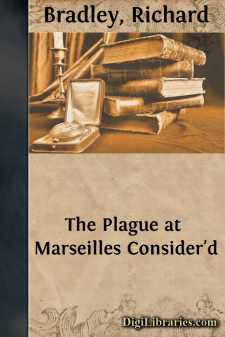Categories
- Antiques & Collectibles 13
- Architecture 36
- Art 48
- Bibles 22
- Biography & Autobiography 813
- Body, Mind & Spirit 142
- Business & Economics 28
- Children's Books 17
- Children's Fiction 14
- Computers 4
- Cooking 94
- Crafts & Hobbies 4
- Drama 346
- Education 46
- Family & Relationships 57
- Fiction 11829
- Games 19
- Gardening 17
- Health & Fitness 34
- History 1377
- House & Home 1
- Humor 147
- Juvenile Fiction 1873
- Juvenile Nonfiction 202
- Language Arts & Disciplines 88
- Law 16
- Literary Collections 686
- Literary Criticism 179
- Mathematics 13
- Medical 41
- Music 40
- Nature 179
- Non-Classifiable 1768
- Performing Arts 7
- Periodicals 1453
- Philosophy 64
- Photography 2
- Poetry 896
- Political Science 203
- Psychology 42
- Reference 154
- Religion 513
- Science 126
- Self-Help 84
- Social Science 81
- Sports & Recreation 34
- Study Aids 3
- Technology & Engineering 59
- Transportation 23
- Travel 463
- True Crime 29
The Plague at Marseilles Consider'd
by: Richard Bradley
Description:
Excerpt
PREFACE.
here would be little Occasion for a Preface to this Treatise, if the last Foreign Advices had not given us something particular relating to the Pestilence that now rages in the South Parts of France; and what may more particularly recommend these Relations to the World, is, because they come from Physicians, who resided at the Infected Places.
The Physician at Aix gives us the following Account.
The Contagious Distemper, which has become the Reproach of our Faculty here for above a Month past, is more violent than that at Marseilles; it breaks out in Carbuncles, Buboes, livid Blisters, and purple Spots; the first Symptoms are grievous Pains in the Head, Consternations, wild Looks, a trembling Voice, a cadaverous Face, a Coldness in all the extreme Parts, a low unequal Pulse, great Pains in the Stomach, Reachings to Vomit, and these are follow’d by Sleepiness, Deliriums, Convulsions, or Fluxes of Blood, the Forerunners of sudden Death. In the Bodies that are open’d, we find gangrenous Inflammations in all the lower Parts of the Belly, Breast and Neck. Above fifty Persons have died every Day for three Weeks past in the Town and Hospitals. Most of them fall into a dreadful Phrenzy, so that we are forc’d to tie them.
The other is a Letter from a Physician at Marseilles, sent to John Wheake, Esq; who was so kind to give me the Abstract.
Marseilles Sept. 15. 1720.
Sir,
I Arriv’d here the 8th, and enter’d the Gate of Aix which leads to the Cours, which has always been esteem’d one of the most pleasant Prospects in the Kingdom, but that Day was a very dismal Spectacle to me; all that great Place, both on the Right and Left, was fill’d with Dead, Sick, and Dying Persons. The Carts were continually employ’d in going and returning to carry away the Dead Carcasses, of which there were that Day above four Thousand. The Town was without Bread, without Wine, without Meat, without Medicines, and in general, without any Succours.
The Father abandon’d the Child, and the Son the Father; the Husband the Wife, and the Wife the Husband; and those who had not a House to themselves, lay upon Quilts in the Streets and the Pavements; all the Streets were fill’d with Cloaths and Houshold-Goods, strew’d with Dead Dogs and Cats, which made an insupportable Stench. Meat was Sold at 18 to 20 Sous per Pound, and was only distributed to those that had Billets from the Consuls: This, Sir, was the miserable State of this City at that Time, but at present, Things have a better appearance; Monsieur le Marquis de Langeron, who Commands here, has caused the Dead to be Buried, the Cloaths and Goods to be burnt, and the Shops to be open’d, for the Sustenance of the Publick.
Two Hospitals are prepar’d where they carry all the Sick of the Town, good Orders are daily re-establish’d, and the Obligation is chiefly owing to Monsieur de Langeron, who does Wonders. However, there is not any Divine Service Celebrated, nor are there any Confessors. The People die, and are buried without any Ceremonies of the Church; But the Bishop, with an undaunted Courage, goes thro’ the Streets, and into Publick Places, accompanied with a Jesuit and one Ecclesiastick, to Exhort the Dying, and to give them Absolution; and he distributes his Charity very largely....



